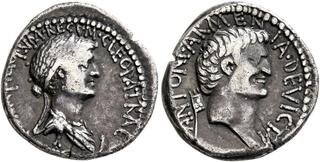| Leu Numismatik AG > Web Auction 28 | Auction date: 9 December 2023 |
| Lot number: 3265 Price realized: 4,400 CHF (Approx. 5,002 USD / 4,645 EUR) Note: Prices do not include buyer's fees. | Show similar lots on CoinArchives Find similar lots in upcoming auctions on |
| Lot description: Cleopatra VII of Egypt, 51-30 BC, with Mark Antony. Denarius (Silver, 18 mm, 3.92 g, 12 h), Alexandria, autumn 34. CLEOPATRAE R[EGINAE•]REGVM•FILIORVM•REGVM Diademed and draped bust of Cleopatra to right; below, prow to right. Rev. ANTONI•ARMENIA•DEVICTA Bare head of Mark Antony to right; behind, Armenian tiara. Babelon (Antonia) 95. Crawford 543/1. CRI 345. RBW 1832. Sydenham 1210. Beautifully toned. Flan crack and some scratches, otherwise, very fine. From the T. Fribie Collection and the Korwin Collection, Classical Numismatic Group 103, 14 September 2016, 671. Cleopatra's and Mark Antony's Alexandrian portrait denarii were traditionally dated to 32 BC. However, their legends and iconography clearly connect them to Antony's campaign against Armenia in 34 BC and the subsequent infamous 'Donations of Alexandria'. Upon Antony's return from what was little more than a looting expedition to distract from his disastrous defeats against the Parthians, a great victory spectacle was organized in the Egyptian capital in which captives were paraded and donatives distributed. Most striking, however, was that the queen and the general distributed titles and kingdoms to themselves and their children, with Cleopatra being named Queen of Kings and Queen of Egypt and claiming Cyprus, Libya and central Syria for herself, Alexander Helios 'receiving' Armenia, Media and Parthia, his twin sister, Cleopatra Selene, Cyrenaica and Libya, and Ptolemy Philadelphus Syria, Phoenicia and Cilicia. These donations of what were, with the exception of Egypt proper, mostly either Roman provinces or unconquered lands (such as Media and Parthia) caused great outrage in Roman society. Worst of all was the proclamation of Julius Caesar's and Cleopatra's mutual son, Caesarion, as King of Kings, god, and divi filius ('son of god'), and his appointment as his father's sole legitimate heir. This was a direct challenge to Octavian's claim to power, which stemmed from his adoption by Julius Caesar and the loyalty of the dictator's legions, and would only accelerate the irreversible break between the two most powerful men of the Roman world. Starting price: 750 CHF |  |



